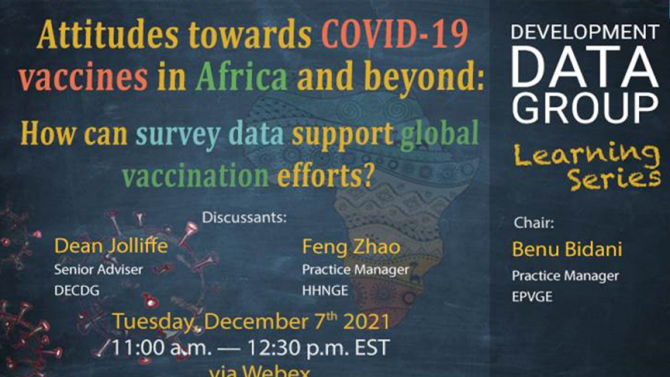As COVID-19 vaccine access has become near universal in high-income countries and vaccination rates surpassed 60 percent in many instances, large swathes of the global population living in low- and middle-income countries remain critically exposed to the virus. The policy dialogue in low- and middle-income countries has focused on vaccine supply and issues of financing. As the vaccine supply increases and in light of the experiences in high-income countries, questions of barriers to access and vaccine hesitancy and demand have come into fresh focus.
This webinar presented ongoing work from the Health, Nutrition, and Population GP, the Poverty & Equity GP, and DEC on attitudes towards vaccines around the world, identifying lessons learnt and knowledge gaps, with a view of improving upcoming data collection efforts (via phone or face-to-face) on vaccine acceptance, demand, and access informing operations supporting the global vaccination efforts.
The first presentation highlighted findings on vaccine acceptance from a cross-country analysis of six Sub-Saharan African countries, based on two rounds of data from High Frequency Phone Surveys in countries participating in the Living Standards Measurement Study – Integrated Surveys on Agriculture (LSMS-ISA) program. The data reveal high to very high willingness to be vaccinated, albeit with specific pockets of hesitancy.
The second presentation presented results from ongoing joint work by the Health and Poverty Global Practices on understanding heterogeneity in attitudes towards vaccination in several developing countries, to inform World Bank operational responses.
The seminar aimed to inform the discussion on two levels: What do the findings mean for the designing of effective plans for vaccination roll-out and the sensitization campaigns around them, and how can the Bank continue supporting the collection of data that are operationally relevant.
Speaker Bios
Philip Wollburg is an Economist in the World Bank’s Development Data Group in the Data Production and Methods Unit and a core team member for the World Development Report 2021 on Data for Better Lives. His research interests include agriculture, poverty, and climate impacts in low-income countries, as well as methodological aspects of and technological innovation in the measurement of key development indicators. Prior to joining the World Bank, he worked with the Food and Agriculture Organization of the UN (FAO) and led a project aimed at delivering innovative renewable energy solutions to smallholder agricultural and fisheries communities in East Africa. He holds a post-graduate degree in development economics from the University of Oxford.
David Newhouse is a Senior Economist in the World Bank’s poverty and equity global practice, and a fellow at the Institute of Labor Economics. His work has focused on economic measurement, including integrating survey data with non-traditional data, and analysis related to poverty and jobs in developing countries. He currently co-leads the Sub-Saharan Africa team for statistical development, co-leads the Jobswatch Covid-19 project, and contributes to the global Data for Goals team. He holds a PhD in Economics from Cornell University, and has published over twenty articles in respected field journals on labor, poverty, health, and education in developing countries.
Jakub Kakietek is a Senior Health Economist at the Global Financing Facility for Women, Children, and Adolescents within the Health Nutrition, and Population Global Practice. He works on health financing in low and middle-income countries with a focus on determinants of access to health services. He is part of the multi-GP collaboration bringing together colleagues form the GFF/HNP GP, Poverty and Equity GP, and DEC around the analysis of data form the Bank’s high-frequency poverty surveys. He holds a PhD in Political Science from Emory University, a MSc in Health Economics from the London School of Economics and Political Science, and a MPH from the Rolling School of Public Health.
Resources:
- Access the presentations here
|
